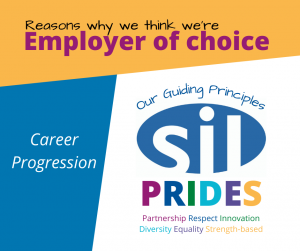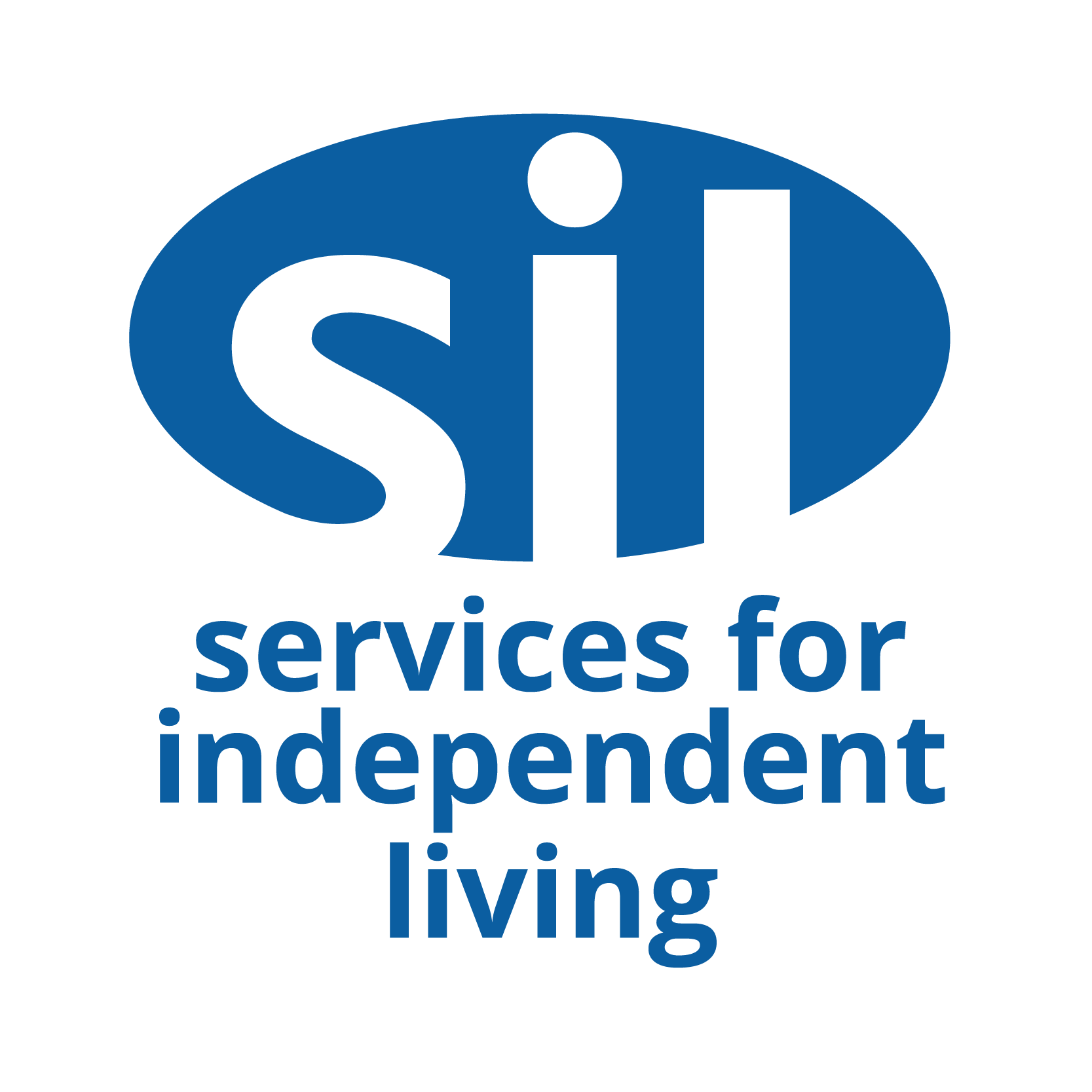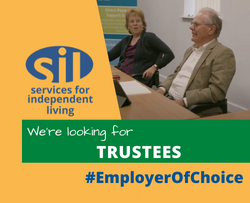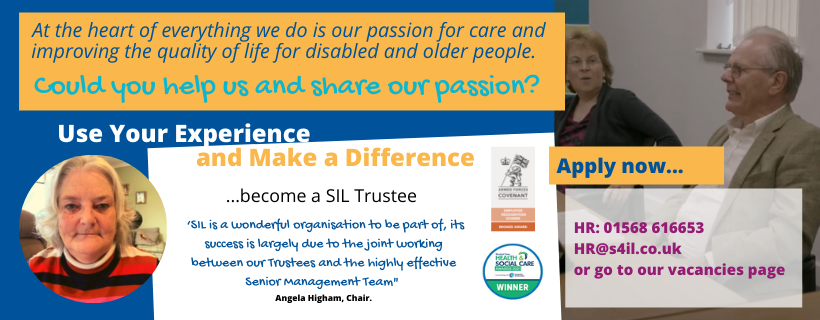
Often when you start a job, you don’t plan to be working in the same role forever, you want it to be a stepping stone to something greater.
In some careers, there’s an obvious path to follow, but in social care, there are lots of options. If you start out as a Care Assistant or Support Worker, you could end up almost anywhere!
Some opportunities for career progression might use skills you’ve learnt directly as a care worker. Others might look at your transferable skills, such as being well-organised and adaptable.
Have you ever had to juggle dropping kids at school and racing back home for a boiler service before taking the dog to the vet, going to the Post Office and picking the kids up again? If so, your time management skills are probably spot on!
Career progression at SIL doesn’t always mean staying with us, we respect your need to grow and will support you in your progression even if it that means we’ll lose you. Having said that we have great opportunities within our organisation, and some of our Care Assistants and Support Workers have recently gone on to other roles such as Team Leaders and Deputy Homecare Manager. Our CEO started out his career as a Support Worker!

Career progression – where could I go?
You might already know where you want your career to take you. If not, the opportunities may not be what you expected…
What interests you?
Career progression doesn’t have to follow a set path.
Think about the aspects of your current job that you enjoy most. It might be something you do every day or a less regular task. Is there a way you can incorporate that into your career progression?
For example:
- If you really enjoy helping your service users do their hair, would you be interested in becoming a hair stylist?
- If planning activities for your service users is the best part of your job, why not consider becoming an activity coordinator?
- Or would you rather stay with the same company and continue moving up the career ladder?
- Do you want to use you knowledge of working with disabled and older people at a Local authority level, why not consider becoming a social worker?
- Do you want to continue working directly with service users, or would you prefer to move to a more office-based role?
Do you want to study or take additional qualifications?
Some jobs, such as nursing or some management roles, might need additional study or qualifications. At SIL, we offer a huge range of opportunities from training that will help you to support particular service users to gaining qualifications in management and to support your development within SIL, and potentially beyond SIL.
Training and development is funded by SIL and in most cases you will also be paid for your time. The exception to this may be qualifications but you would be granted time for study and meetings with your tutors.
We also have access to a wide range of training for personal interests such as Interior Design or Massage Diplomas which are provide free of charge but would be studied in your own time.
What work schedule do you want?
As a care worker, you’re probably used to working shifts and unsociable hours. For some people, career progression is a way to move to a more “standard” schedule. However, some people love working nights or changing shifts. Consider what you’d like from your new role.
What roles could I progress to after working as a Support Worker?
Here are some of the roles that you might consider after working as a Care Assistant or Support Worker.
Specialising in specific areas
You may want to continue delivering personal care and directly supporting service users to stay independent.
Plenty of Care Assistants and Support Workers love their current role, as well as the flexibility it offers.
However, there are still ways to progress your career. For example, if you really enjoy supporting people with certain conditions or disabilities, you could choose to work predominantly in those areas.
For example, if you’re particularly good at helping service users with autism or dementia, you could look for roles that focus on those conditions. If you’ve found a lot of fulfilment when helping service users at the end of their lives, you could look at roles in hospice or palliative care.
You may be able to take additional qualifications in your area of interest.
Senior Homecare Support Worker or Team Leader
Seniors or Team Leaders work with service users, but in a different way. It’s still a job that’s mostly on the front line of care, as opposed to in the office.
Our Team Leaders assess service users and create care plans, and supervise and shadow care workers. Your knowledge of supporting service users and regulatory compliance will be hugely important in this role.
Homecare Care Coordinator / ILH Administrator
A more office-based role, our co-ordinator and administrators put together care rotas, maintain continuity of care where possible, and ensure that everything is compliant with regulations.
If you’re super-organised, flexible and know how to motivate your colleagues, this role could be a great place for you.
Registered Manager
Registered managers are a key part of any care organisation, including SIL. They’re responsible for all of the people and processes in their branch – that includes care workers, service users, support plans, budgets, policies, and much more.
It’s a big responsibility, and you’ll need to be a confident leader – as well as being good at keeping up with admin work. You’ll need to keep up with changing regulations, and will ideally have some extra qualifications in health and social care.
Having front line care work experience is vital to being a good manager. Your experiences working directly with service users mean you’ll understand your teams’ daily challenges.
Nursing & Nursing Assistants
While being a care worker is very different to nursing, this is a great path for career progression.
As a successful Care Assistant or Support Worker, you’ve got many of the same skills. You’re already compassionate and work well under pressure, some key factors in being a good nurse.
Not only that, but you’ve probably worked with many nurses over your career and know a fair amount about what their job involves.
Non-care Administrative Roles
As you work within a company, you’ll come across different jobs that might interest you and get to know different teams. You might have learnt more about marketing, IT or payroll and would like to get involved there.
Some areas, like Learning and Development or Compliance, might draw on your current workplace knowledge. But, depending on your area of interest, you might need to do some further study or qualifications, either before applying or while you’re working.
If you’re interested in moving to a different area of a business, talk to people in those teams to find out about their skills and qualifications, or ask the recruitment team for more information about what they look for in a candidate.
Ok I’m ready to start my career in care…
Go to our vacancies to see our latest opportunities, call HR: 01568 616653 or email hr@s4il.co.uk. You don’t need qualifications to get started in care just the right attitude and to be kind, caring person.







